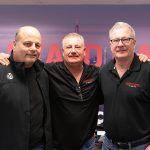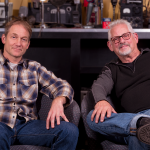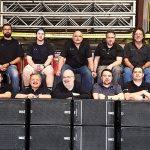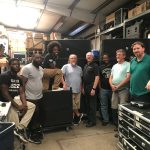After graduating from college with a degree in electrical engineering, George Clark started to look around for something to do. His older brother, Houston, had a business degree and years of experience in information systems as a software salesman. He was looking for something different to do.
"George wanted to merge his passion with vocation," recalls Houston, "and we decided we'd like to do something together. So, in July of 1996 we formed a company and then spent a couple of years trying to figure out where we wanted to hang our hat."
As the duo was sorting through their options, they became affiliated with an evangelical Christian church that had just opened its doors. Turns out the team at North Point Community Church in Atlanta needed an audio system in their new facility.
"A God Thing"
"We happened to be starting when the church was starting." Houston says. "George designed and we installed the PA in their first room, which was about a 2,700-seat room."

Not a bad beginning for a young company, and the name Clark Pro Media spread throughout the evangelical market. Shortly after completing the work at North Point, the brothers were asked to consult on a number of rooms in the area and built a reputation for solid work.
The brothers also brought with them a higher ideal for church audio systems. George recalls that, back then, most churches featured very modest systems. "It was a couple of microphones, and if you had more than a couple of subwoofers in a location, you were considered extreme," he says with a laugh. "That was just not our mindset. Our mindset has always been high-fidelity, really going for that last five or ten percent of what people want."
It's a lesson that he learned from studying the John Meyer approach to audio. "That's the school that I grew up in. He would always say that you can design to the fraction of an inch and back away, but you can never design more coarse than that and then go right down to it," George explains. "You need to think finer. So, our mindset has always been to design it to the absolute best right way and then, as budget dictates, we can start slowly zooming out."
Pursue Your Passion
The philosophy paid off, and in short order, the two found themselves (along with a handful of lighting and video pros) in churches across the land, working on a number of "skyscraper" churches, including the Fellowship Bible Church in Dallas, Granger Community Church in Indiana and Mars Hill Church in Seattle.

"We started in audio, because that was George's passion, and we built the business with folks passionate about video and theatrical lighting," Houston explains. "That gave us a full design/build service where we were designing anything that has to do with live performance and implementing it. We were one of the first companies to go national with that design/build approach."
While the company was working on churches from Florida to Washington, they had to be careful with the gear they were installing. "We learned what was marketing hype about technology and what really worked," George says. "We got ourselves educated, because we had to make sure these systems are bullet-proof. We are an Atlanta-based firm, and we had to make sure we weren't having to send warranty service guys all across the country, because that would kill the company. We made sure the quality was designed in from the beginning."
Fourteen years after completing the project at North Point, Clark Pro Media has opted to evolve its business and approach. Effective the first of February, the company will be known simply as Clark' and the approach will grow beyond traditional audio, video and lighting.
"We are not getting out of the AVL business," Houston clarifies, "but after a year of market research and taking what we know about systems and how they work within the context of [church] culture, we're moving into working with churches to help them plan their facilities strategically so their buildings and systems aren't battling one another."
A Non-Traditional Approach
The change in approach was formulated based on a transition that Houston and George have seen taking place in the church business for the past 10 to 15 years. "Traditional churches had a steeple, stained glass windows and a pipe organ," Houston explains, "and those facilities simply do not support the more relevant performance technologies of today. George calls it arena rock in churches, where it's more of a contemporary environment. We have spent the past decade understanding what it takes to not have the facility fight the system and vice versa. That's a huge issue in the church space."
Moreover, Houston says, today's churches are looking for more flexibility in their spaces, and Clark is gearing up to assist them in strategically planning how to meet those challenges.
"The other thing we see, and I think this is really critical and why we are positioning our company as Clark and the expanded services, is that we don't believe culturally or economically there are going to be the number of mega church facilities popping up that we've seen over the last decade," Houston says. "We think there's a drive and a push for more localization of church, and how the church can be interwoven into daily life."
As an example, Houston mentions his own church's push to expand out to multiple campuses in the area.
What will be staying the same is Clark's dedication to working exclusively in the evangelical Christian church market. "George and I have a heart and passion for the evangelical church, and that's where we've focused our attention and time," Houston says. "That generally means if you're not an evangelical church you probably don't value what we do. We're trying to understand what an evangelical church values. If you value a $1M pipe organ, you are not going to value a Meyer PA."



